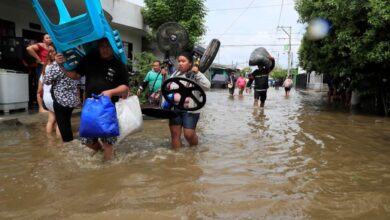Gorgona and Other Natural Spaces Threatened by Military Bases
In Recent Weeks, the Construction of a US Military Base on Gorgona Island has Raised Questions in Colombia About the Threat to Biodiversity and to the Communities that Live There.

Photo: Wikimedia-Sailko
LatinAmerican Post | María Fernanda Ramírez Ramos
Escucha este artículo
Leer en español: Gorgona y otros espacios naturales amenazados por las bases militares
Gorgona is one of the most important natural treasures for Colombia. It is an island in the Pacific that has been recognized as a Biological Heritage of Humanity for its exuberant biodiversity and unique species in the world. Likewise, fundamental biological processes for marine ecosystems take place there, such as the migration of whales. In fact, the island has enormous potential for nature tourism.
However, his story has many nuances. It was a high security prison for 25 years, until civil society demanded that it be closed. "In 1984, scientists, environmentalists, and human rights defenders led a campaign to have the prison closed. Thus, the Park was created, including a valuable portion of the surrounding marine area. It has been dubbed 'Science Island' because of the amount of information that it has given researchers to understand the ecosystems and for the effective management of the protected area", points out Parques Nacionales Naturales . In fact, internationally recognized plans have been developed there for their work in the preservation of turtles and other species. The International Union for Conservation of Nature has this park, which includes the islands of Gorgona and Gorgonilla, on its green list of protected areas. "The Gorgona National Natural Park is a small paradise of diversity that is obvious when approached from the depths of the sea," says the organization.
However, for some years now, it has become a point of view for US geopolitical interests. In 2015, the National Authority for Environmental Licenses ANLA issued resolution 1730 in which the execution of a project for a coast guard station was allowed. Subsequently, in 2018 there is a new resolution (00772) requested by the Ministry of Defense in which aspects of this project are clarified. The truth is that it is a project in alliance with the United States Army.
We recommend you read: From "Backyard" to "Dumpster": This is How the US is Using Latin America as its Dumping Ground
Many opposing voices
Today, the inhabitants of Guapí, Cauca, the municipality to which the island belongs, are asking President Gustavo Petro to disapprove this environmental license and prevent the construction of this base. The reasons are that the different facilities that are intended to be built there, with a fuel tank, a tower with radar, and a 132-meter pier, would have negative effects on the ecosystems of this world heritage site. Likewise, the communities do not want US interference in their territories.
Various voices have come together to demand that the government not allow the construction of the military base in Gorgona. Social and environmental leaders, journalists, activists, and organizations have come out to oppose it. Likewise, local communities in the Gorgona Park area of influence have been claiming that they were never consulted about this project and that they oppose the pier and the military base. In fact, the vice president, Francia Márquez, has supported these claims.
However, voices are divided. The journalist María F. Fitzgerald, for Cambio Magazine, did an investigation on the matter and interviewed several environmental experts who were consulted to develop the project, such as Sandra Valenzuela, president of the Group of Experts of the Green List in Colombia, or Rodrigo Botero, director of the Foundation for Conservation and Sustainable Development. The latter indicated for Cambio that: “I do not agree with the discourse of those who, without knowing much about the work, are condemning it. The presence of the Navy could be very good to stop many crimes that occurred in the area. However, I believe that a lot of misinformation has also been spread about the project”.
Other US military bases in Latin America and the world
The United States has about 800 military bases around the world. The reasons that the North American country put forward to justify the construction of these military bases are related to the fight against organized crime, drug trafficking or terrorism, as well as the facilitation of humanitarian aid, cooperation, and attention to natural disasters. However, a deeper analysis allows us to understand that these are usually located in strategic territories for the interests of this country, either because of their natural resources, their strategic position for trade or the political situation of the place.
In other words, it really is a question of geopolitics and Colombians are not the only ones who have had to face the dilemma of building these bases. In fact, the United States already has about 80 bases in Latin America and the Caribbean. One of the most recent bases that has caused confrontations is the Neuquen base in southern Argentina, on the border with Brazil and Paraguay. Coincidentally, there are reserves of gas, oil, and lithium. Various local media and social organizations have denounced this construction and demanded that the advance of this base be prevented.
Likewise, the US military base in Rota, Cádiz, has generated questions in Spain. The Ecologists in Action group has denounced spills of fuel and waste in the sea that damage the marine ecosystem. In addition, there are multiple investigations that indicate that military bases leave toxins where they are. For example, an investigation published in Scientific America reports that various toxic and polluting residues were left in Afghanistan by US bases.
It should be noted that the United States military bases have been widely questioned for multiple reasons, not only for the impact on ecosystems. In fact, in Colombia, there have been complaints of human rights violations by soldiers, such as sexual abuse committed against minors. Thus, in addition to environmental impact, there are other factors to consider.




